Within the new EFA’s 2023-2025 Prevention programme, we structured our work around those long-lasting thematic issues in EFA’s advocacy agenda: improving food labelling information, reinforcing tobacco, and smoking laws, reducing exposure to chemicals in everyday products, and improving indoor air quality legislation (and ventilation).
Food labelling
During 2023, EFA kept its advocacy around food allergy at a speedy pace. Notably, EFA’s community and work shifted considerably towards informing the international FAO/WHO Codex Alimentarius Committes (CAC), a standard setting body where discussions on crucial aspects of food labelling, including allergen labelling, are being intensively looked. The European Commission is represented at CAC.
EFA Food Allergy Working Group
In 2023, EFA Food Allergy Working group met seven times online to share community information, discuss EFA positioning towards allergy labelling discussions at international and European level. EFA warmly thanks its members of the Food Allergy Working Group for their continuous support and valuable input that, for another year, enabled a strong engagement by the food allergy patient community, with over 20 representatives from 14 different countries attending the meetings.
EFA food allergy community advocacy
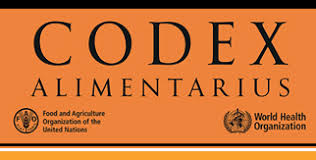 As observer to CA since 2019, EFA actively contributed to the development of guidelines, and standards through various feedback procedures organised by the Codex Committee on Food Labelling (CCFL). In total, EFA food allergy community brought the patient perspective to seven CA consultations in 2023 that were also published in EFA’s website:
As observer to CA since 2019, EFA actively contributed to the development of guidelines, and standards through various feedback procedures organised by the Codex Committee on Food Labelling (CCFL). In total, EFA food allergy community brought the patient perspective to seven CA consultations in 2023 that were also published in EFA’s website:
- 2 On the revision of General Standard for the Labelling of Prepacked Food (GSLPF)
- 1 On the draft guidelines on precautionary allergen labelling (PAL), to be added as Annex to the GSLPF
- 2 On the proposed guidelines on the provision of food information for pre-packaged foods offered via e-commerce
- 2 On the proposed guidelines on the use of technology to provide food information in food labelling
EFA participated in the 47th meeting of the CCFL in Ottawa, Canada with a delegation composed of the two EFA representatives at Codex, EFA President Marcia Podestà and Sabine Schnadt, from the German Allergy and Asthma Association (DAAB), who had the opportunity to engage with key decision-makers from the national, EU, and the international level. Among other interventions, EFA representatives stressed that allergen labelling should be clear and understandable, especially for foods that involve species with scientific names e.g. fish, crustacea; and also explicitly supported soy to remain in the priority allergen list of the GSLPF.
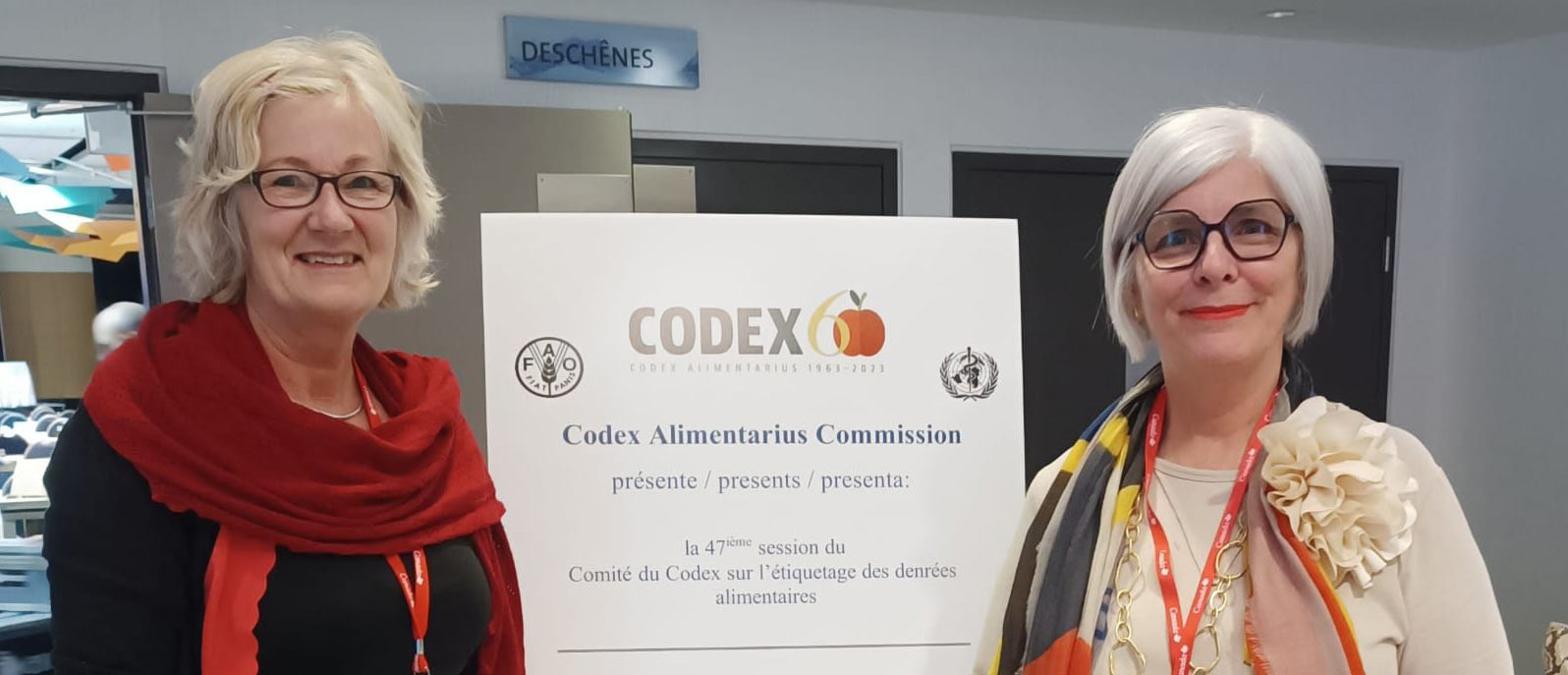
EFA’s Sabine Schnadt (left) and Marcia Podestà (right) in between the intensive discussions during the CCFL47 meeting in Canada. EFA was one among the four patient organisations worldwide attending the meeting.
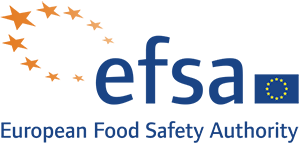
As stakeholders to the European Food Safety Authority (EFSA), EFA took part in its 6th annual Stakeholder Forum meeting and discussed food safety preparedness planning under a One Health approach.
EFA was also invited to discuss the perspective of the food allergy patient community with the Hygiene & Official Controls Working Group of the FoodDrink Europe (FDE), the main industry association representing food manufacturers in Europe. EFA Senior Policy Advisor, Panagiotis Chaslaridis, presented our positions on important matters, such as the current application of precautionary allergen labelling and vegan claims, novel foods, and emerging allergens.
Tobacco and smoking
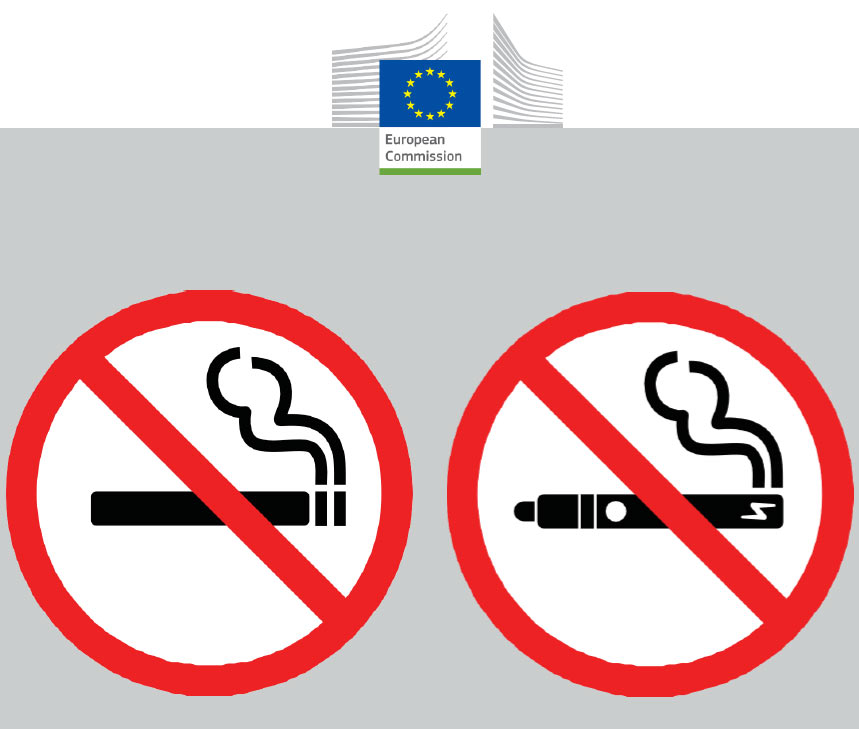
Tobacco and smoking policies are drivers to health and crucial to reduce allergy and airways diseases. With our community of affected citizens, in 2023 EFA was vocal in bringing the patients’ perspective throughout the European Commission processes to update the EU tobacco control.
Between May and July, EFA took part in two public consultation stages for the evaluation of the EU tobacco control legislative framework, which includes the Tobacco Products Directive (TPD) and the Tobacco Advertising Directive (TAD). In addition, EFA published a statement highlighting the health burden of smoking and showcasing the gaps in the existing legislation.
We also worked extensively on the update of the 2009 Council recommendation on Smoke-Free Environments, contributing to European Commission targeted survey and consultative interview. Based on EFA members’ community input through the Prevention, Allergy & Asthma, and COPD Working Groups, we supported with evidence the ambition of the Commission to extend the scope of the smokefree recommendations and apply to novel tobacco and other smoking products. We also urged the Commission to fully protect citizens and patients from harmful secondhand smoke by extending smokefree policies to cover more public spaces, such as the hospitality sector. While the Commission proposal was expected to be published by the end of 2023, unfortunately the whole process has been delayed.
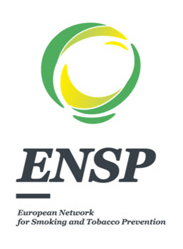
As members of the European Network of Smoking, Prevention and Control (ENSP), we raised awareness about the European Citizens Initiative (ECI) to ‘Call to Achieve a Tobacco-Free Environment and a European Tobacco-Free Generation by 2030. The initiative called for bigger ambition than the Tobacco-Free Generation by 2040 planned by the Commission, and specifically to extend smokefree coverage to places frequented by children and the elimination of tobacco advertising and presence in social media platforms.
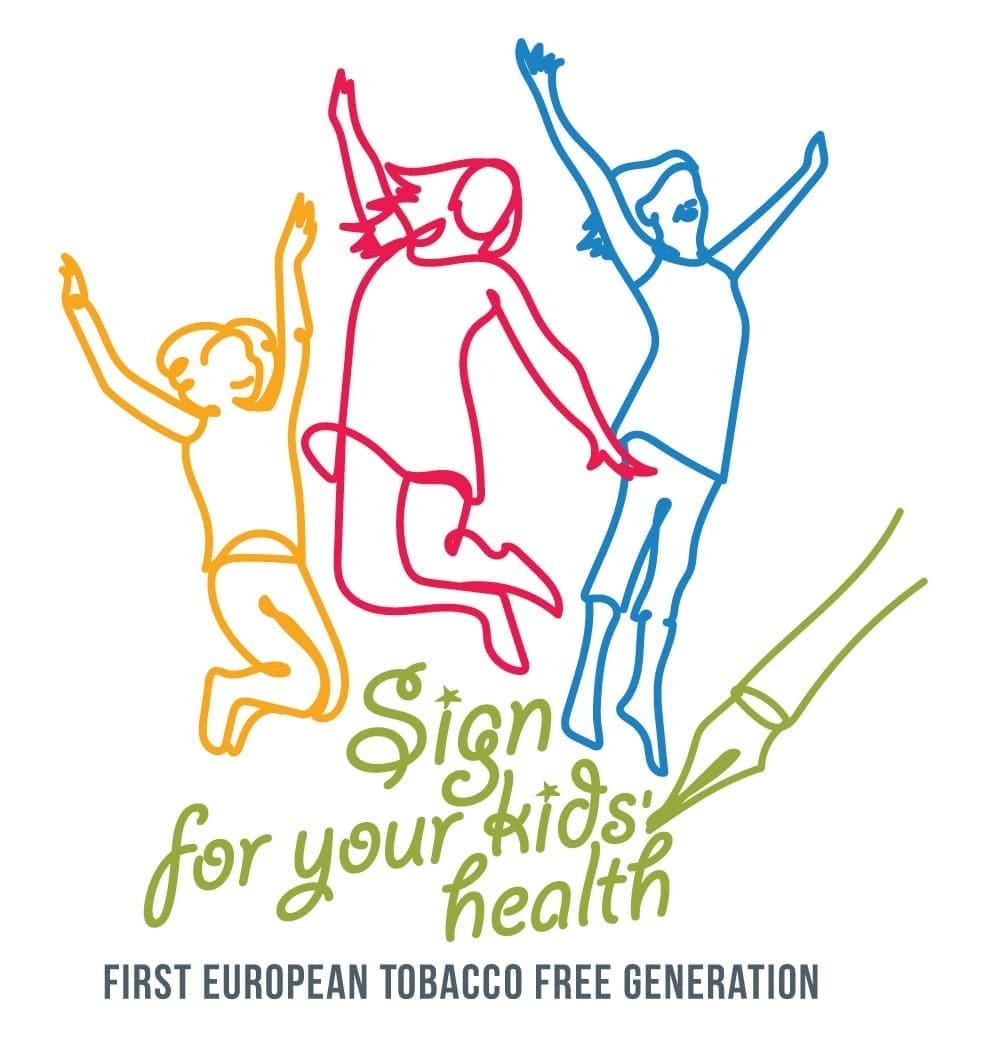
An ECI is an official tool through which civil society can put forward policy proposals on a specific issue and ask the European Commission for action. It requires 1 million validated signatures, and the achievement of certain thresholds in each country.
Chemicals

In 2023, EFA was selected to participate in the Stakeholder Forum of the Partnership for the Assessment of Risk from Chemicals (PARC). EFA, represented by Prof. Artur Badyda from EFA Member the Polish Federation of Asthma, Allergy and COPD Patients’ Organisations, will be partnering in work packages dealing with setting a science-policy agenda around chemicals and health, and on advancing monitoring of exposure and health impacts. EFA participated in the first stakeholder meeting that took place in Athens, in June.
Indoor Air quality
Throughout 2023, EFA continued working to highlight the importance of ventilation and insulation for healthy indoor air quality (IAQ) as the multiple sources that contribute to indoor air pollution - emissions from heating & cooking, tobacco smoke, dampness, and mould-, are strongly associated with the onset and exacerbation of allergy, asthma, and COPD.
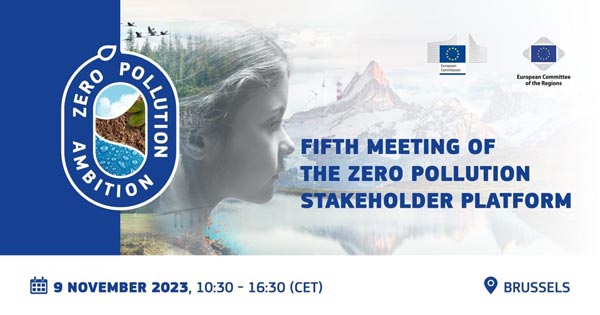
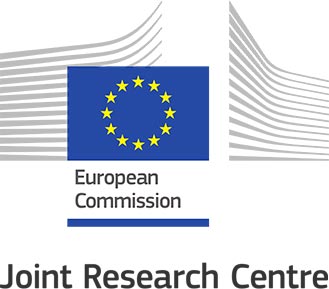
EFA called for the need to improve IAQ levels, research, monitoring, and legislation in multiple occasions in 2023:
- Revision of the EU Ambient Air Quality Directives;
- Revision of the 2009 Council recommendation for Smoke-Free Environments;
- Indoor environment workshop organised by the European Commission Health Emergency Preparedness and Response Authority (HERA) and the Joint Research Centre (JRC) to scope current technologies for indoor air quality and protection of airborne pathogens, and scanning of future technologies;
- Meetings of the Zero Pollution Stakeholder Forum, a European Commission Expert Group where we are members, and where we have consistently pushed for an integrated and legislative approach to air quality, including indoors;
- EFA’s joint written statement on lung health to the 73rd WHO Regional Committee meeting in Astana, where we urged for improved indoor air quality through addressing pollution sources, such as cookstoves, but also better ventilation and building renovation.
In 2023, EFA fostered collaboration between the European Public Health Alliance (EPHA) and EFA’s Spanish member FENAER, on a project addressing the health impacts of gas cooking. In the context of this collaboration, EFA’s Vice-President Armando Ruiz participated in the launch project event Clean Cooking for Public Health, organised by EPHA.
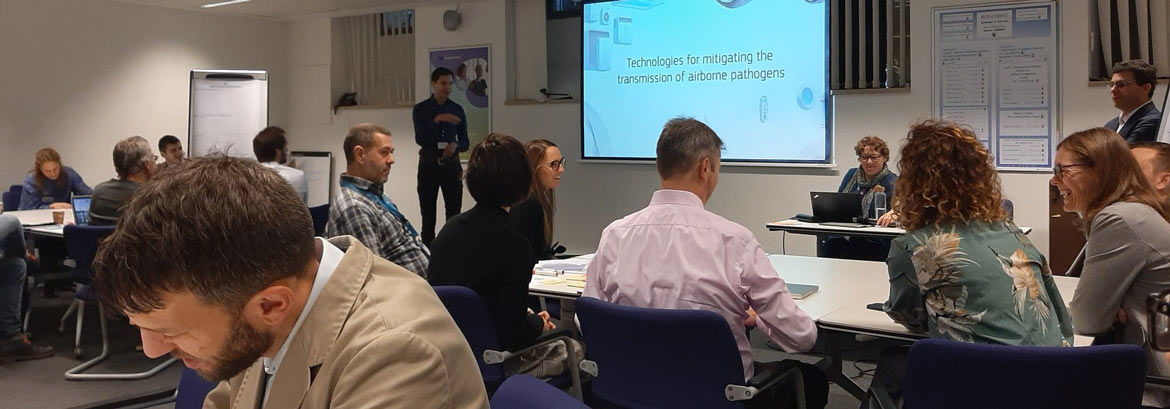
EFA brought the patient, citizen centeredness to the European Commission workshop exploring technologies to suppress transmission of pathogens, decontaminate indoor environments, and improve detection of pathogens indoors.